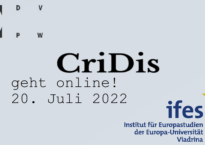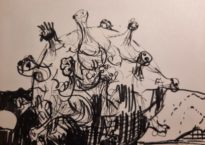20 July, 2022: Presentation of CriDis and its Covid-19 special edition at IFES
On 20 July, 1-2pm, you will have the occasion to discuss with CriDis editors, including Dr Amelie Kutter, Dr Christiane Barnickel and Dr Elena Dück, the…

On 20 July, 1-2pm, you will have the occasion to discuss with CriDis editors, including Dr Amelie Kutter, Dr Christiane Barnickel and Dr Elena Dück, the…

The editors of this first issue of the Crisis Discourse Blog are proud to be able to present a collection of carefully crafted blog posts. They look into the repercussions the pandemic has had on ‘the political’, on what constitutes our political struggle and political identities in the pandemic era. What emerges from this collection is a nuanced view of ‘the pandemic political’ and of the contribution discourse analysis can make to cognise the implications of Covid-19. It demonstrates the complementary or alternative insights that are revealed when one applies different traditions of discourse research and genres of critical reading[:]

6 July, 2022, 2:30 pm CriDis and its special edition on Covid-19 and the political will go online at the 9th conference of the Critical Approaches…
Many of the measures taken to fight the pandemic are based upon differentiations between social groups. The visibility and relevance of these groups, the groups themselves and the ‘knowledge’ about them, especially the inclusions and exclusions associated with them, however, do not represent objective realities but are discursively constructed. Based on a review of discourse analytical literature on inclusions and exclusions in Covid-19 discourses, the blog post discusses how these discourses reconfigure the political. It makes a plea for integrating the media aesthetics of the audiovisual image in order to account for the multimodality of discursively reinforced inclusions and exclusions.